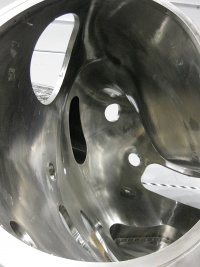Stellarator
A stellarator is a magnetic confinement device. The rotational transform is predominantly generated by external coils - as opposed to a tokamak, in which the poloidal field is generated by plasma currents. Hybrid concepts (including the concepts known as quasi-axisymmetry and quasi-omnigeneity) employ both external coils and self-generated (bootstrap) currents (e.g. NCSX).

Classification of stellarators
Somewhat arbitrarily, stellarators may be classified according to the type of magnetic configuration.
- Torsatron / Heliotron: the rotational transform is produced by an external helical coil surrounding the plasma.
- Heliac: a stellarator with a toroidally helical magnetic axis.
- Helias: advanced stellarator with modular coils.
Defunct stellarators
Operational stellarators
Future stellarators
See also
- Stellarator reactor
- Stellarator optimization
- International Stellarator and Heliotron Workshop
- Coordinated Working Group Meeting
- Stellarator symmetry
- Stellarator News
- ARIES Project (conceptual design of a compact stellarator)
- Spherical Stellarator design study
References
- M. Wakatani, Stellarator and Heliotron devices, Oxford University Press, New York and Oxford (1998) ISBN 0-19-507831-4
- P. Helander, Theory of plasma confinement in non-axisymmetric magnetic fields, Rep. Prog. Phys. 77 (2014) 087001